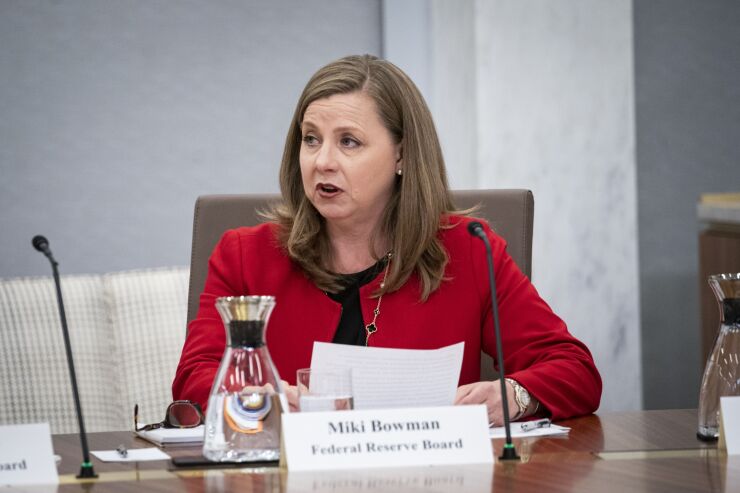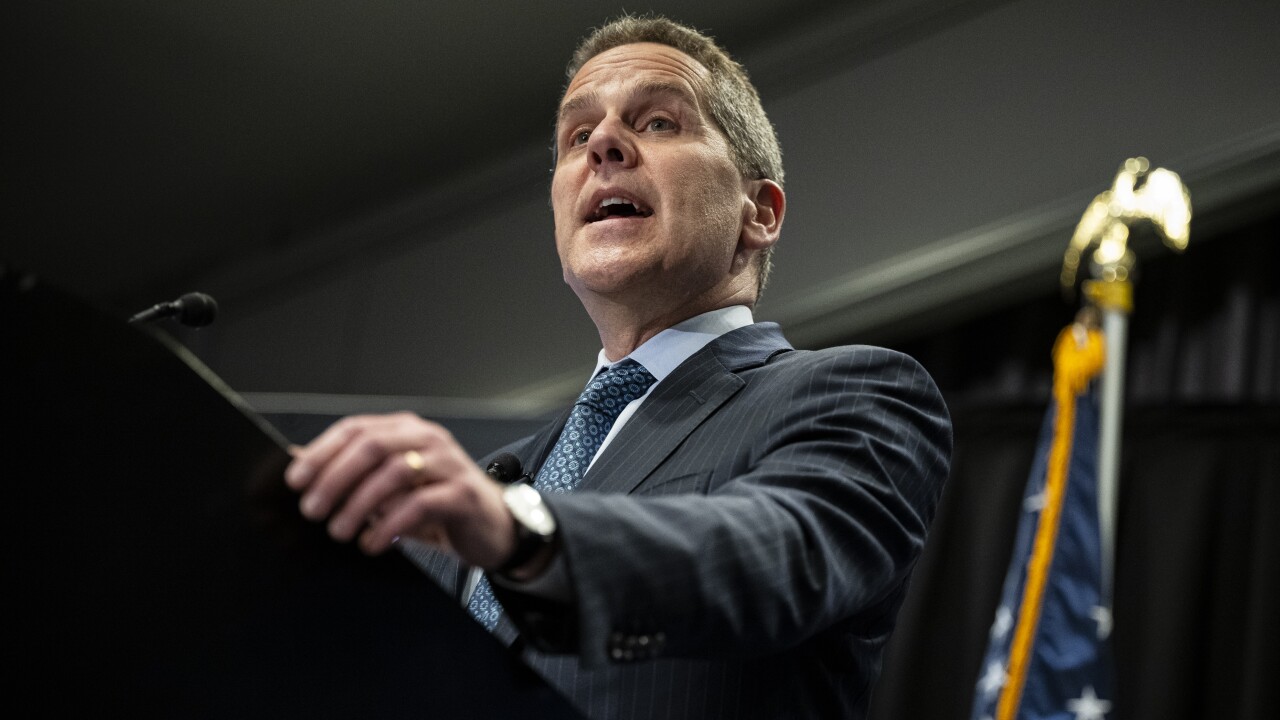
Changes could soon be coming to the Federal Reserve's regulatory capital framework, but small banks need not worry about more burdensome requirements.
During a speech Friday at the Tennessee Bankers Association's Credit Conference, Fed Gov. Michelle Bowman said community banks will be exempt from the central bank's ongoing "holistic" capital review.
"I do want to make sure that everyone knows that small banks are not included in this capital review," Bowman told the audience during a question and answer session. "We think we've done a good job of making sure that small banks have strong capital requirements."
She did not define small banks, which by some definitions can be financial institutions up to $10 billion or $20 billion of assets.
Fed Vice Chair for Supervision Michael Barr has made a
Barr has not said whether he thinks the review will lead to capital requirements that are higher, lower or effectively the same as the existing framework, but in a December speech he argued that current bank capital requirements in the U.S.
Bowman agrees that a review of capital requirements is appropriate, given that the current framework is more than a decade old, largely stemming from the Dodd-Frank Act of 2010. She also noted the upcoming deadline to implement the final components of the international supervisory guidelines known as the Basel III endgame. She said she intends to work with Barr on the review.
Yet Bowman's view on the current level of capital going into the review seems to differ from Barr's. She pointed to the sector's resilience through the COVID-19 pandemic as evidence that banks are sufficiently capitalized.
"We've been through a significant crisis within the last few years, with a pandemic or an environment that was very stressful, and all of our banks have very strong capital, very strong liquidity coming out of that crisis," she said Friday. "It seems to me, for the most part, that framework has worked very well. So, I think it'll be, of course, important to review how the requirements are working and make sure we're [correct] in the understanding that things have been working well."
Bowman said the Economic Growth, Regulatory Relief, and Consumer Protection Act of 2018 bolstered the capital readiness of community banks. The legislation, introduced by Sen. Mike Crapo, R-Idaho, called for a community bank leverage ratio, which swapped out more burdensome risk-based requirements for a
Bowman also addressed several other regulatory topics during the events. One attendee raised the question of how the Fed is dealing with political pressure to incorporate environmental, social and governance — known collectively as ESG — factors into its regulatory regime.
Nodding to its ongoing
"Small banks, more than anybody, really understand the intricacies of the industries that you're banking," she said. "There's a lot to understand about specific conditions that you face in all of your loan portfolios and your vulnerabilities to natural disasters at your physical branch location or your headquarters. These are things that we've asked you to understand and manage those risks for as long as we've probably been supervising institutions."
Bowman, a frequent defender of community banks, reiterated the importance of tailoring regulatory requirements based on the size of institutions. She said the Fed will take the principles of tailoring into consideration with every rule change it considers or piece of guidance that it issues.
She also discussed the importance of transparency and predictability within the Fed's regulatory and supervision activity, but noted that her emphasis on those factors was not a call for lax enforcement.
"We need a very safe and very sound banking system. Financial stability relies on the stability of the banking system," she said. "So, please don't misunderstand that transparency, because it is very important that we're rigorous with our application of our supervision."
Bowman also discussed payments-related topics: FedNow, the Fed's forthcoming instant settlement network, and potential for the creation of central bank digital currency, or CBDC, in the United States.
Bowman said the introduction of FedNow will likely satisfy market demands for a faster, more secure and lower-cost payment settlement system, which she believes to be the driving force behind calls for a U.S. CBDC.
Still, while she does not see a clear need for the implementation of a digital dollar, she said it is important for the Fed to stay well versed in developments around CBDCs, because so many other countries are pursuing them.
"We've identified this as an important area for us to get to know and understand when the technology behind it might be implemented, even if we may or may not be interested in implementing one or creating one at any point," she said. "It is important that we understand how we would deal with conflict from a financial perspective, because other countries are developing these central bank digital currencies."
With the






